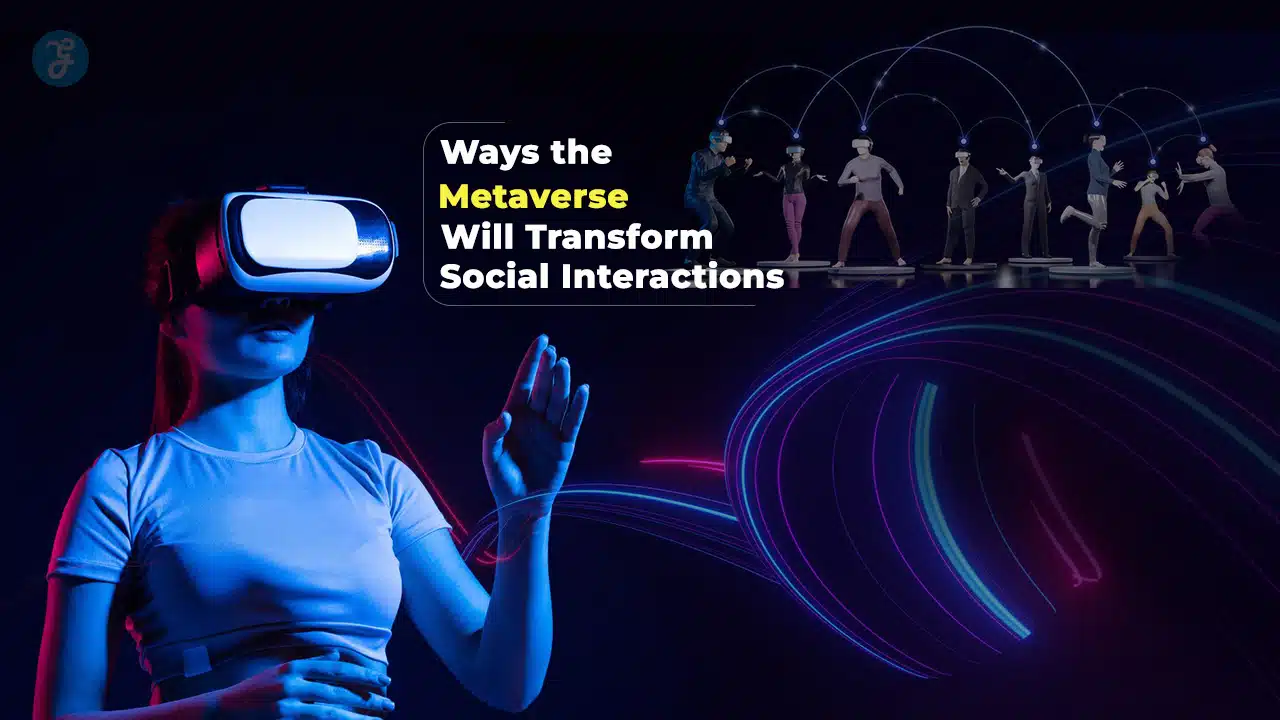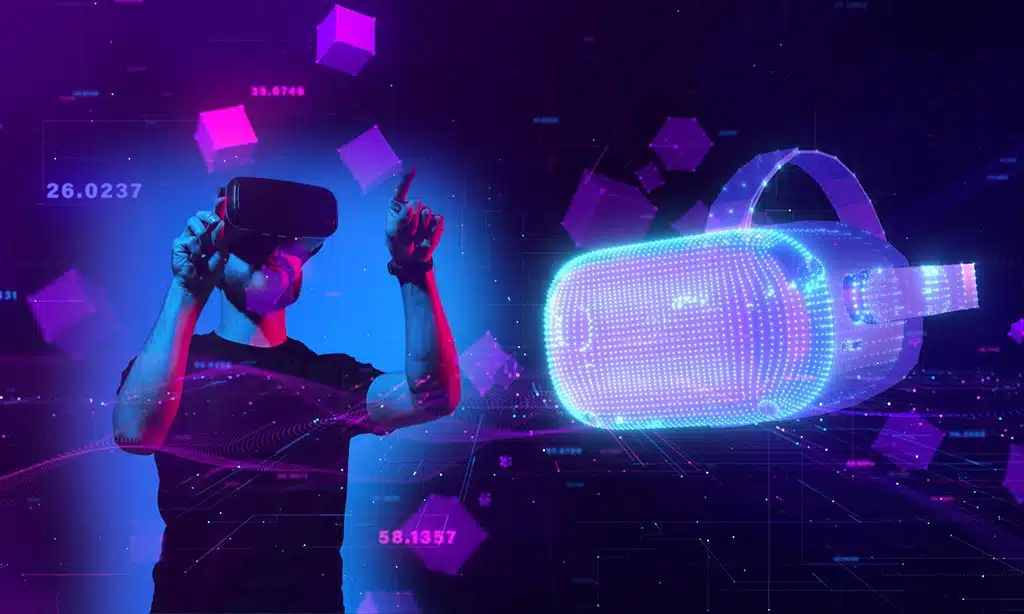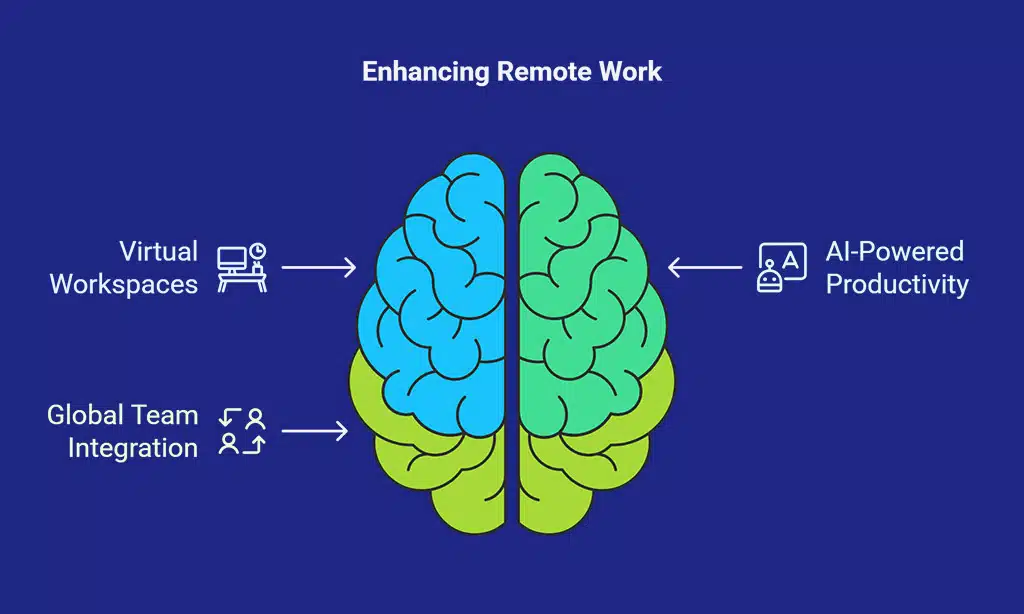The Metaverse is revolutionizing the way people connect, communicate, and interact. As virtual spaces evolve, digital experiences are becoming more immersive, offering new opportunities for social engagement.
From virtual social gatherings to enhanced remote work collaboration, the Metaverse is redefining human connections.
In this article, we explore seven powerful ways the Metaverse will transform social interactions, offering insights into how these changes will shape the future of digital communication.
Understanding the Metaverse and Its Impact on Social Connectivity
As digital technology advances, the Metaverse is emerging as a transformative force in the way people interact socially. This new digital frontier is not just an extension of the internet but a revolutionary shift that redefines human connections, making them more immersive, interactive, and engaging.
By leveraging virtual reality, blockchain, and AI, the Metaverse provides a seamless blend of real and virtual interactions, fundamentally changing how we communicate, work, and build communities.
What is the Metaverse?
The Metaverse is a collective virtual space where users interact through digital avatars. It integrates technologies like virtual reality (VR), augmented reality (AR), artificial intelligence (AI), and blockchain to create immersive digital environments.
Unlike traditional online platforms, the Metaverse enables real-time interaction in 3D spaces, making social engagements more lifelike.
How the Metaverse is Redefining Social Interactions?
- Virtual Presence vs. Physical Presence: Users can meet, socialize, and collaborate in virtual spaces without physical constraints.
- From Text-Based to Immersive Communication: Instead of traditional chats or video calls, the Metaverse offers voice-enabled, 3D, and AI-powered interactions.
- Enhanced Personalization: Digital avatars provide users with creative self-expression through custom features, digital fashion, and virtual accessories.
The Role of AI and Blockchain in Metaverse Interactions
- AI-Driven Avatars: AI enables lifelike avatars with realistic facial expressions and speech patterns, enhancing communication.
- Blockchain-Based Trust and Identity: Decentralized identities ensure secure and verifiable user interactions, reducing the risk of fraud.
7 Ways the Metaverse Will Transform Social Interactions
As the digital landscape evolves, the Metaverse is set to revolutionize the way people engage with each other. This immersive virtual space is breaking traditional barriers, enabling deeper and more interactive forms of communication.
From social networking to business collaborations, the Metaverse offers limitless possibilities for reshaping human interactions in ways never seen before.
1. Virtual Social Gatherings and Events
The Metaverse is redefining how people experience social events by offering highly immersive and interactive virtual environments. From attending live concerts with real-time audience reactions to participating in professional conferences with AI-powered networking, virtual gatherings are becoming the preferred way to connect.
The ability to host large-scale events without geographical limitations enables broader participation and fosters new ways of engagement that were previously unimaginable.
Key Benefits:
- Global Accessibility: No geographic barriers; anyone can attend events from anywhere.
- Immersive Experiences: Virtual environments simulate real-life event spaces, enhancing engagement.
- Networking Opportunities: Users can interact with professionals and influencers in a more interactive setting.
| Feature | Traditional Events | Metaverse Events |
| Location | Physical venues | Virtual spaces |
| Cost | High travel and accommodation expenses | Lower costs with digital attendance |
| Accessibility | Limited by geography | Open to global audiences |
| Interaction | Face-to-face | Avatar-based, AI-enhanced |
2. New Forms of Digital Identity and Avatars
In the Metaverse, users can create and personalize avatars that reflect their identity, allowing for diverse expressions and unique digital personas. These avatars go beyond simple customization, enabling users to represent themselves in ways that transcend physical limitations. With advancements in AI, avatars can mimic real-world facial expressions, gestures, and even voice tones, making virtual interactions more lifelike.
Users can also own and trade digital fashion, accessories, and virtual assets, further enhancing self-expression. The ability to integrate avatars across different platforms ensures a seamless digital identity, strengthening social bonds in the virtual space.
Key Aspects:
- Self-Expression: Users design avatars with digital fashion and accessories.
- Interoperability: Avatars can be used across different Metaverse platforms.
- Emotional Connection: AI-driven avatars can display human-like emotions, making interactions more engaging.
| Feature | Traditional Online Profiles | Metaverse Avatars |
| Customization | Limited | Highly customizable |
| Expressiveness | Static images, text-based | Real-time expressions, AI-driven motions |
| Interoperability | Confined to a single platform | Cross-platform integration |
| Economic Value | No real-world value | Tradeable digital assets, NFTs |
3. Enhanced Remote Work and Collaboration
The Metaverse is transforming remote work by introducing immersive virtual offices, real-time collaboration tools, and AI-driven productivity solutions. Employees can interact in 3D workspaces, participate in virtual brainstorming sessions, and use digital whiteboards to enhance creativity.
With AI-powered virtual assistants, task automation and project management become more efficient. Additionally, remote workers can build a stronger sense of community through personalized avatars, virtual team-building activities, and networking events, creating a more connected and engaged workforce despite geographical distances.
Advantages:
- Virtual Workspaces: Employees can meet in 3D offices with interactive tools.
- AI-Powered Productivity: AI assistants help automate tasks and manage workflows.
- Global Team Integration: Employees from different countries can collaborate seamlessly.
| Feature | Traditional Remote Work | Metaverse Remote Work |
| Collaboration Tools | Video calls, emails | 3D virtual offices, AI-powered assistants |
| Team Engagement | Limited interaction | Immersive experiences, real-time engagement |
| Productivity | Standard workflow tools | AI-driven automation, digital brainstorming |
4. Social Gaming and Interactive Experiences
Gaming in the Metaverse is more than entertainment—it’s a dynamic social experience where players form deep connections, build global communities, and engage in play-to-earn economies. Players can explore vast virtual worlds, interact with others in real time, and even develop social skills in cooperative or competitive settings.
Metaverse gaming offers endless possibilities, from forming in-game friendships to participating in immersive storytelling experiences and digital economies where players can earn cryptocurrency or NFTs by contributing to virtual ecosystems. The evolution of gaming within the Metaverse is paving the way for entirely new forms of digital interaction, transforming how users engage with content, each other, and their online identities.
Trends in Social Gaming:
- Multiplayer Metaverse Games: Real-time interaction with players worldwide.
- VR-Based Social Clubs: Gamers gather in virtual lounges to strategize and socialize.
- Play-to-Earn Models: Players earn real-world rewards through blockchain-based economies.
| Feature | Traditional Gaming | Metaverse Gaming |
| Interaction Type | Limited social features | Full social immersion |
| Economic Model | Pay-to-play, in-game purchases | Play-to-earn, blockchain-based economies |
| Community Building | Forums, chats | Virtual social spaces, real-time collaboration |
5. Decentralized Communities and Social Networks
Unlike traditional social media, the Metaverse fosters decentralized and community-driven platforms where users have greater control over their data and interactions. These platforms operate on blockchain technology, ensuring transparency, security, and user sovereignty. With decentralized social networks, individuals can create and moderate their own communities, reducing dependence on centralized authorities that often control content and user data.
This shift empowers users with ownership over their digital presence, allowing for more meaningful and autonomous online interactions. Additionally, these platforms encourage fairer monetization models, enabling content creators to directly benefit from their contributions without intermediaries.
Notable Changes:
- DAOs (Decentralized Autonomous Organizations): Community-driven governance models.
- Blockchain-Based Social Media: No central authority, more user privacy.
- Enhanced Digital Ownership: Users truly own their content and digital assets.
| Feature | Traditional Social Media | Metaverse Social Networks |
| Data Control | Centralized by companies | User-owned, decentralized |
| Privacy | Limited control over data | Enhanced privacy with blockchain |
| Monetization | Revenue through ads | Direct user monetization |
| Engagement | Text and video-based | Immersive 3D experiences |
| Moderation | Company-controlled policies | Community-driven governance |
6. Virtual Dating and Relationships
The Metaverse is reshaping online dating by providing immersive and interactive experiences beyond traditional dating apps. Unlike conventional platforms that rely on text-based messaging and static profiles, the Metaverse offers dynamic, three-dimensional environments where users can engage in lifelike conversations, explore virtual locations together, and build deeper connections through shared experiences.
AI-driven matchmaking enhances compatibility predictions, while VR interactions create a more authentic sense of presence. Additionally, digital economies enable users to exchange virtual gifts and participate in social events, making the dating experience more engaging and personalized.
Innovations in Virtual Dating:
- VR Dating Spaces: Couples can go on virtual dates in unique digital settings.
- AI Matchmaking: AI-powered algorithms improve compatibility predictions.
- Metaverse Weddings: Some couples even host virtual weddings in the Metaverse.
| Feature | Traditional Online Dating | Metaverse Dating |
| Interaction Type | Text, video calls | VR-based, immersive environments |
| Matchmaking | Algorithm-based | AI-driven, behavior-adaptive |
| Social Activities | Limited | Virtual events, interactive experiences |
7. Education and Social Learning in the Metaverse
Education is becoming more engaging and accessible through interactive Metaverse learning environments, where students and educators can collaborate in immersive 3D spaces. These digital classrooms enable hands-on learning experiences, interactive simulations, and virtual field trips that make complex subjects more comprehensible.
Additionally, AI-driven tutors provide personalized learning paths, while blockchain-based certifications ensure credibility and accessibility of academic achievements. The Metaverse also fosters global educational communities, connecting students from different cultural backgrounds and enhancing knowledge-sharing like never before.
Transformative Aspects:
- Virtual Classrooms: Students attend interactive, 3D educational sessions.
- Global Learning Hubs: Connects learners from different countries.
- Skill-Based Training: Hands-on learning with AI-driven simulations.
| Feature | Traditional Education | Metaverse Education |
| Learning Methods | Textbooks, lectures | 3D simulations, VR-based lessons |
| Accessibility | Limited by location | Global reach, cross-border learning |
| Engagement | Passive learning | Hands-on, interactive learning |
Challenges and Ethical Considerations
As the Metaverse continues to revolutionize social interactions, it also brings forth significant ethical and security concerns. While it enables unprecedented connectivity, it raises questions about user safety, data privacy, and mental well-being. Understanding these challenges is crucial to ensuring a responsible and sustainable digital future.
Privacy and Data Security Concerns
- Personal data vulnerabilities in virtual spaces.
- Risks of identity theft and unauthorized access.
Mental Health and Social Isolation Risks
- Balancing virtual and real-world interactions.
- Potential addiction to Metaverse activities.
The Digital Divide and Accessibility Issues
- Limited access to advanced Metaverse technology.
- Bridging the gap between digital and non-digital communities.
Wrap Up
The Metaverse is undeniably transforming social interactions in profound ways, redefining how people connect, work, play, and learn. While it offers incredible opportunities for global connectivity, digital identity, and immersive experiences, ethical challenges must be addressed to ensure a balanced and inclusive virtual future.
As the Metaverse evolves, embracing its potential while staying mindful of its impact will be crucial in shaping a socially responsible digital era.






































